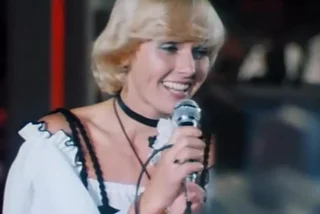Czech band We Are Domi has made it to the finals of the Eurovision Song Contest. They will perform first out of 25 competitors in the televised annual event that attracts over 180 million viewers worldwide.
The final round of Eurovision will be broadcast on Saturday, May 14, on ČT2 at 9 pm and will also stream over the official Eurovision channel on YouTube. Several local venues including A Maze in Tchaiovna, Rocky O'Reillys Irish Pub, and Patra will also be hosting watch parties. You can also catch up with the semifinal rounds over YouTube if you missed them.
People can vote for the winners via sending an SMS, but cannot vote for the act representing their own country. The winner is selected based on a mix of viewer and jury votes. Bands that prove popular with viewers are often not the jury favorites, which makes the final tallying of votes quite tense.
We Are Domi competed in the second semifinal group with the song "Lights Out" and advanced along with nine other acts from that round. These winners plus the 10 winners of the first semifinal and the five nations that automatically qualify – France, Germany, Italy, Spain, and the United Kingdom – will make up the 25 competitors for the right to host next year's contest.
Italy is hosting this year's contest, held at Pala Alpitour in Turin since Italian act Måneskin won the 2021 edition.
The opening spot may prove a disadvantage, as We Are Domi will not be fresh in viewers' minds when voting takes place at the end of the show. And while the Eurovision contest tries to avoid politics, this year’s entry from Ukraine, folk-rap band Kalush Orchestra, is widely favored to win. In an unusual move, Eurovision’s organizers, the European Broadcasting Union (EBU), disqualified Russia due to the invasion of Ukraine.
“For our country, it is so important to have victories in all ways. So if we win, it will be another opportunity to show Ukraine to the world, to remind people about Ukraine, and to increase morale in the whole country,” Kalush Orchestra member Oleh Psiuk said when the band qualified for the final after the first round.
The EBU describes Czech entry We Are Domi as a great example of international cooperation. We Are Domi is led by 26-year-old singer Dominika Hašková, daughter of the famous Czech hockey player Dominik Hašek, who led the Czech national ice hockey team to its first and only Olympic gold medal at 1998 Winter Olympics in Nagano, Japan.
She met her bandmates, guitarist Casper Hatlestad and keyboardist Benjamin Rekstad, both from Norway, at Leeds College of Music in 2016 and originally planned to play together just one time. The band has since relocated to Prague and has released six singles.
On Instagram, the band expressed their excitement ahead of their semifinal performance.
The venue for the contest in Turin is the same arena where the Czech ice hockey team, which included Dominik Hašek, won a bronze medal at the 2006 Turin Olympics.
“People are asking us if we feel it means anything. I hope that I will represent the Czech Republic as well as my father, but honestly, I don't think about it that much. It's more our way, all our families want us to succeed,” Hašková told Czech Television.
"We make music so that everyone can find something for themselves, to make them feel better or happier. I like to say that our song is about what it's like to go out when it's raining and you want to dance and cry at the same time,” Hašková said.
The Czech Republic has entered Eurovision a total of 10 times since 2007 but has yet to win. Counting this year, it has made it to the finals four times. The best showing was in 2018 when Mikolas Josef came in sixth. Czechoslovakia never competed in Eurovision, but singer Karel Gott represented Austria in 1968.












 Reading time: 3 minutes
Reading time: 3 minutes 





























